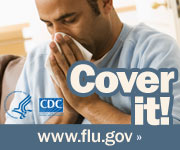| Should you get the H1N1 vaccine?
|
The CDC recommends that people in the following groups should get the H1N1 vaccine as soon as it becomes available:
Pregnant women
Household contacts and caregivers for children younger than 6 months old
Healthcare and emergency medical services personnel
All people from 6 months through 24 years of age
People aged 25 through 64 years with chronic health conditions (including asthma, heart disease, diabetes, HIV, and other disorders)
Ask your doctor if you should get the H1N1 vaccine as well as the seasonal flu vaccine.
|
| Did you know?
|
If you can't wash your hands, alcohol-based hand sanitizers are also effective in preventing the spread of germs - IF they contain at least 60% alcohol. Find out more. |
|
|
As flu season approaches, and especially given concerns about the H1N1 flu (formerly known as "swine flu"), the Diocese of Newark has these recommendations for individuals and congregations.
According to the New Jersey Department of Health, influenza is not currently widespread in New Jersey. These recommendations may be revised if the situation changes.
|
 What Individuals Can Do What Individuals Can Do |
|
Obtain Accurate Information
We recommend these websites for accurate information about the H1N1 flu: Flu.gov (en Espaņol), the Centers for Disease Control and Prevention, or CDC (en Espaņol), and the New Jersey Department of Health.
 An Ounce of Prevention An Ounce of Prevention
The CDC, the Episcopal Church Medical Trust and Christ Hospital in Jersey City have provided information on preventing the spread of flu, and we encourage you to familiarize yourself with it. Simple actions, such as washing your hands, or covering coughs and sneezes with a tissue, can be effective when practiced conscientiously.
You can also ask your doctor whether you should get the H1N1 vaccine when it becomes available. This is a separate vaccine from the one for seasonal flu; for full protection this flu season, both vaccines are necessary.
Receiving Communion
Influenza is mainly an air-borne illness, but if you have concerns about sharing a common cup when receiving Communion, remember that there is no requirement to partake of the common cup -- it is perfectly acceptable and valid to receive the sacrament only in the bread.
Note that intinction (dipping the bread into the wine) does not reduce the risk of infection, and could possibly increase it; fingers are at least as likely a source of transmission as lips.
Passing the Peace
Again, if you have concerns, there is no requirement to shake hands at the passing of the Peace. A verbal exchange of the Peace, perhaps accompanied by a bow of the head or a warm smile, is perfectly acceptable.
Love Your Neighbor (If you're sick, stay home!)
 If you're actively sick, then you're also actively transmitting germs. The CDC recommends that if you become sick with any flu-like illness, you stay home until your fever has been gone for at least 24 hours without the use of fever-reducing medication. If you're actively sick, then you're also actively transmitting germs. The CDC recommends that if you become sick with any flu-like illness, you stay home until your fever has been gone for at least 24 hours without the use of fever-reducing medication.
Love Yourself
Remember that good nutrition, rest, exercise, and stress management will go a long way toward reducing the risk of infection during the flu season.
|
 What Congregations Can Do What Congregations Can Do
|
|
Have an Informed Parish Leadership
A comprehensive guide on H1N1 flu prepared specifically for community and faith-based organizations is one of the many resources available on the Flu.gov website, and we recommend it to all clergy and parish leaders.
 Tell Your Parishioners, "It's OK to stay home if you're sick." Tell Your Parishioners, "It's OK to stay home if you're sick."
The greatest risk for
transmitting influenza is an actively sick person in a public space. So tell your
parishioners that if they're sick with any flu-like
illness, it's OK to miss church or Sunday School or a committee
meeting. Encourage them to stay home and take care of themselves until,
as the CDC recommends, they've been fever-free for 24 hours without the
use of fever-reducing medication. And don't forget to let them know
you're praying for them!
Support Your Parishioners in Healthy Practices
Make sure that boxes of tissues and - just as important - waste receptacles to dispose of used tissues, are readily available throughout your facility.
To facilitate hand washing, make sure your rest rooms are stocked with sufficient supplies of hand soap and paper towels.
Consider placing bottles of alcohol-based hand sanitizer throughout your facility. To be effective, the concentration of alcohol must be at least 60%. Check labels carefully, as some hand sanitizers sold in stores contain less than 60% alcohol.
Support Your Parishioners in Staying Informed
Print and display or distribute any of the posters and other handouts listed in the box at left under "Free resources for congregations."
Practice What You Preach
It is especially important for all clergy, Sunday School teachers and lay people involved in the liturgy (Altar Guild, Eucharistic Ministers, ushers, etc.), to follow the recommendations for individuals outlined above.
|
|
|